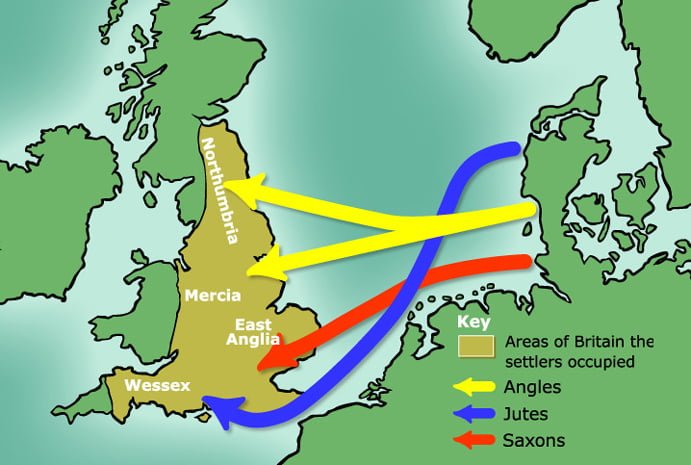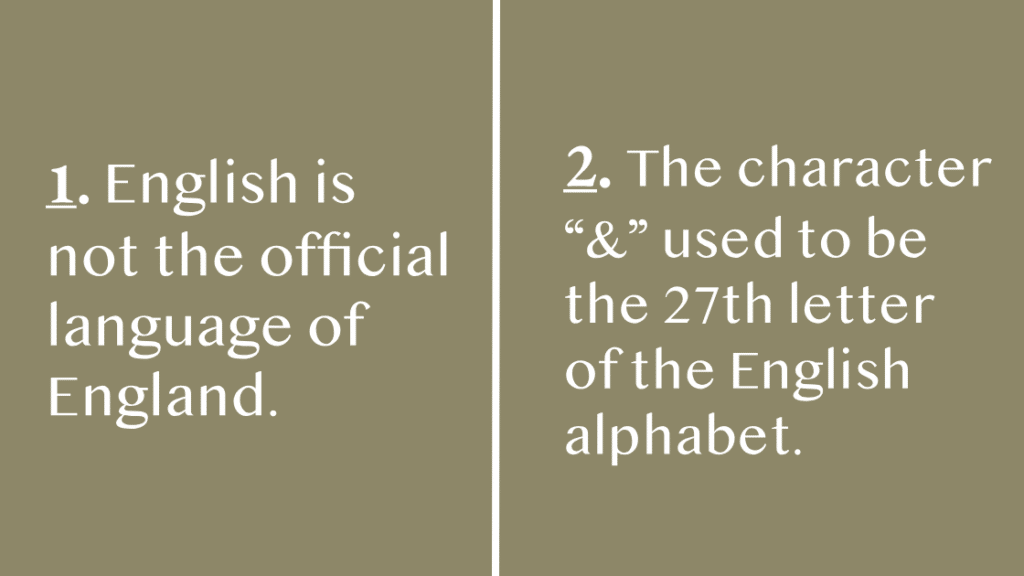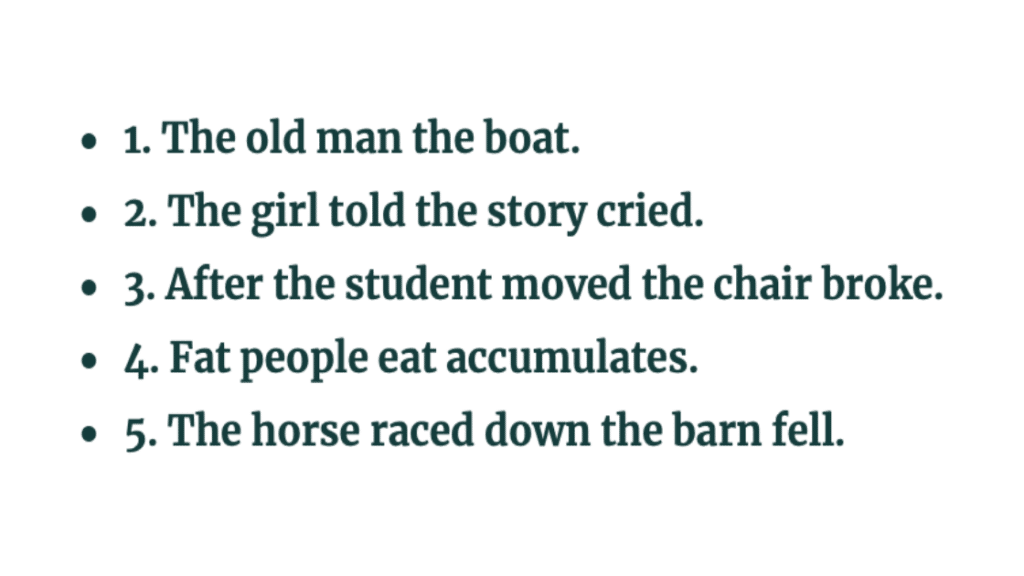War is an
1. What were the specific sociolinguistic conditions in medieval Britain that allowed the maintenance of English?
2. Why do languages become replaced by other languages in the first place?
Let’s start with question number two, and then the answer to number one will become clearer. So, why do some languages replace other languages?
Languages, like economic systems, are self-organizing systems in the sense that properties of the system arise independently of any directing authority. At no point in the history of English has any government had to tell English speakers, “mark plural nouns with an -s suffix”. That just happened on its own as the outcome of the breakdown of a much more complicated inflectional system of Old English. Likewise, people’s choices to use particular languages, and indeed varieties of the same language, arise because of countless decisions on their part based on preexisting conditions around them, as individuals. Speakers in some sense use language as a kind of communicative currency, the value or utility of which varies depending on many independent and interdependent factors, including at least the following seven in roughly decreasing value:
1. Numerical demographics:
How many people are already using a particular kind of speech? English, Spanish, Hindi, and Mandarin are all languages that have huge numbers of speakers (200m+), and so there will always be some kind of ‘market’ for people speaking their languages.
2. Cost-benefit analysis:
Is the language useful to create the kind of life one wants or needs to lead? Some languages are spoken by people with access to particular technologies or particular kinds of advantageous economic systems. German today has far fewer speakers than either Hindi or Bengali, but there are more people in Europe, America, and East Asia actively trying to learn German than Hindi or Bengali. For most people, the cost of learning Hindi is too high despite its higher overall speaker base.
3. Presence or absence of competing languages:
Is there already another language that can achieve the same goals? Until the early modern period, when governments and societies began to invest in their own languages, all scholastic infrastructure was couched in Latin, and so that language had no serious competitors in Europe as a language of science and technology.
4. Geospatial distribution of languages:
How widespread is a language used? With around 800m speakers, Mandarin has almost double English 450m speakers, but almost all those speakers are found exclusively in China, while the infrastructure and speakers of English are found almost everywhere now.
5. What domains of language is a given language used for?
6. Prestige or symbolic value of a language:
like peacocks with their tails, people use language as a symbolic way to make nonlinguistic statements about their worth or value as an individual, and as a community. It comes in two varieties: (1) internal prestige: how a particular language community values (or not) its own language both as a medium of communication and as a source of identity, and (2) external prestige: how people outside the language community value (or not) that language community’s language.
7. Marginally, and relevant only for adults:
How closely related is one language to another? Someone who learns Spanish, French, and Italian is much less impressive than someone who learns Mohawk, Hebrew, and Hausa, because the latter languages have almost no lexicon in common, while the former have most of their lexicon in common, not to mention grammatical differences or similarities.
Now, what was the sociolinguistic environment of early medieval Britain?
When the Normans defeated the Saxons at Hastings in 1066, they arrived in a country that had already effectively witnessed a wholesale linguistic replacement: that of the Celtic-speaking Britons some five or six centuries before. English had also recently sustained rather intense conflict with Scandinavians of various types and some but not all of these invaders had come to settle permanently in the Danelaw. Let’s tally up what the new Norman aristocracy faced:
(1) The Normans came in the tens of thousands, not hundreds of thousands when they secured power for themselves. The indigenous English by comparison probably numbered at least two and a half if not three million people. Even if you double or triple the highest estimate of William’s soldiers at Hastings, around 12k, and assume that additional bureaucrats followed in their wake, the number of Norman French speakers in England was still totally dwarfed by the indigenous population.
(2) It is undeniable that pre-Conquest English aristocrats now had very good reasons to become fluent in French to maintain and add to their power base (though many lost their lands anyway). The vast majority of the peasantry (95% of the population) however never had any such need: the people they interacted with were not the nobles, but the people who oversaw the nobles’ lands, who continued to be primarily English-speaking. Sociolinguistically speaking, England was not entirely unlike the exploitative colonies of 19th-20th century Africa that Salikoko Mufwene has spent decades describing in which an interface class of overseers ran the government for the elites. In this case, many upper elites didn’t even spend much time in England, choosing rather to pursue petty feuds in France.
(3) In most of Britain outside Wales and Scotland (which were at that point not under the English crown anyway), there were essentially no alternatives to speaking English: every community, from top to bottom, was English-speaking. This is even true in the Danelaw, where the Scandinavians had largely assimilated into the local population giving us words like skirt, sky, and the pronoun they.
(4) Since England was almost uniformly English-speaking, there were no pockets of other spoken languages that could possibly have competed with English until the Normans arrived. (Cornish is an exception that proves the rule.) Although English had dialects and diversity within it, from the perspective of the man on the street making a choice between English or French, it was a monolith.
(5) English before the Conquest was one of the few vernacular languages in Europe that actually had a fairly vibrant literary culture: Anglo-Saxon kings were mostly literate, and some of them like King Alfred the Great actually made translations of Latin classics into Old English. This was not true of most languages on the continent. After the conquest, English more or less completely lost its status as a chancellery language to French, but French was instead still competing with Latin as an alternative language in the domain of high literature.
(6) In the 11th century, French did not have the immense internal or external prestige that it was to acquire in later centuries. Indeed, French did not even become the official language of France until 1539, when King Francis I made it the official language of the court. (Just think about that fact for a second.) As such, it is not surprising that the English, especially among the illiterate peasantry, would probably have seen the use of Norman French as the language of occupation rather than of a self-evidently superior conqueror. French probably had high external prestige in comparison to English’s not inconsiderable (but by no means high) internal prestige.
(7) Lastly, although French is an Indo-European language like English, it was nowhere near as similar lexically or grammatically as the Norse spoken in the Danelaw — and that Norse soon disappeared. This criterion is, in any event, relevant only for adults trying to learn French, since children can acquire any human language with ease.
Summary: in most respects, the fate of French was sealed at its arrival: it simply did not have enough traits, whether demographically, economically, or otherwise, in its favor to do more than influence the lexicon of English. It is doubtful that French had a significant effect on English grammar since Old English was well on its way to losing case inflections already.






